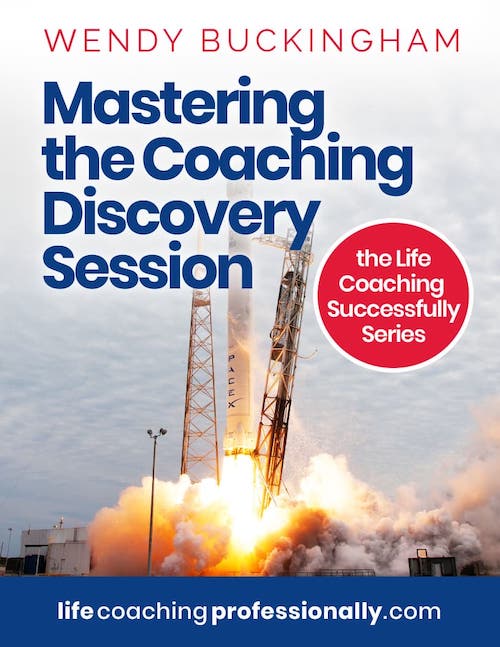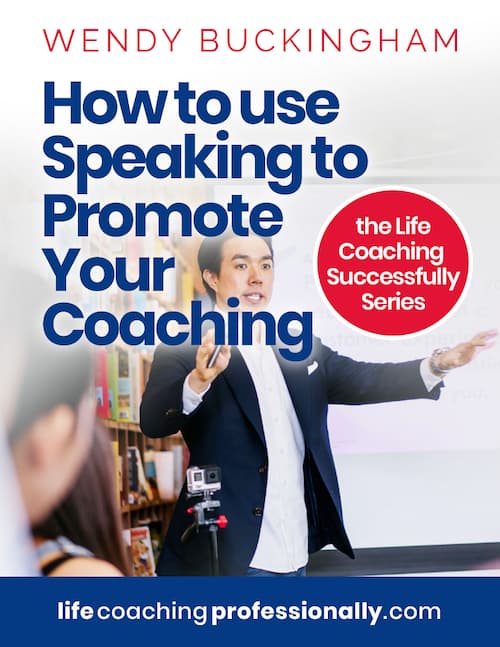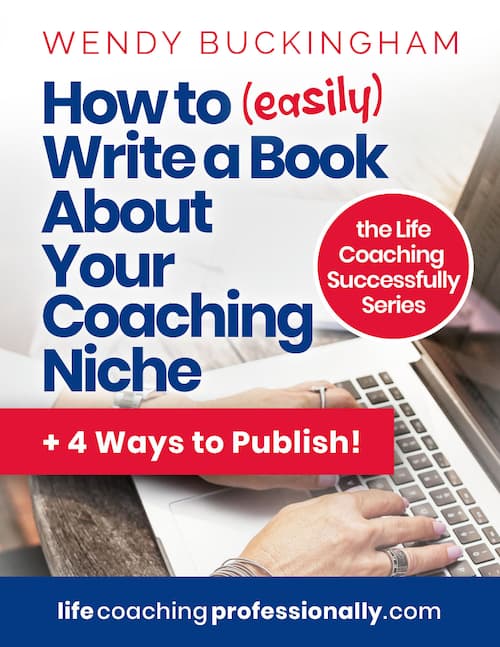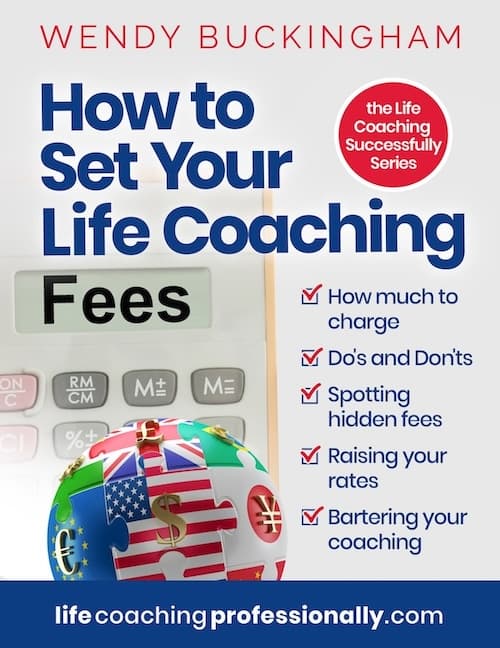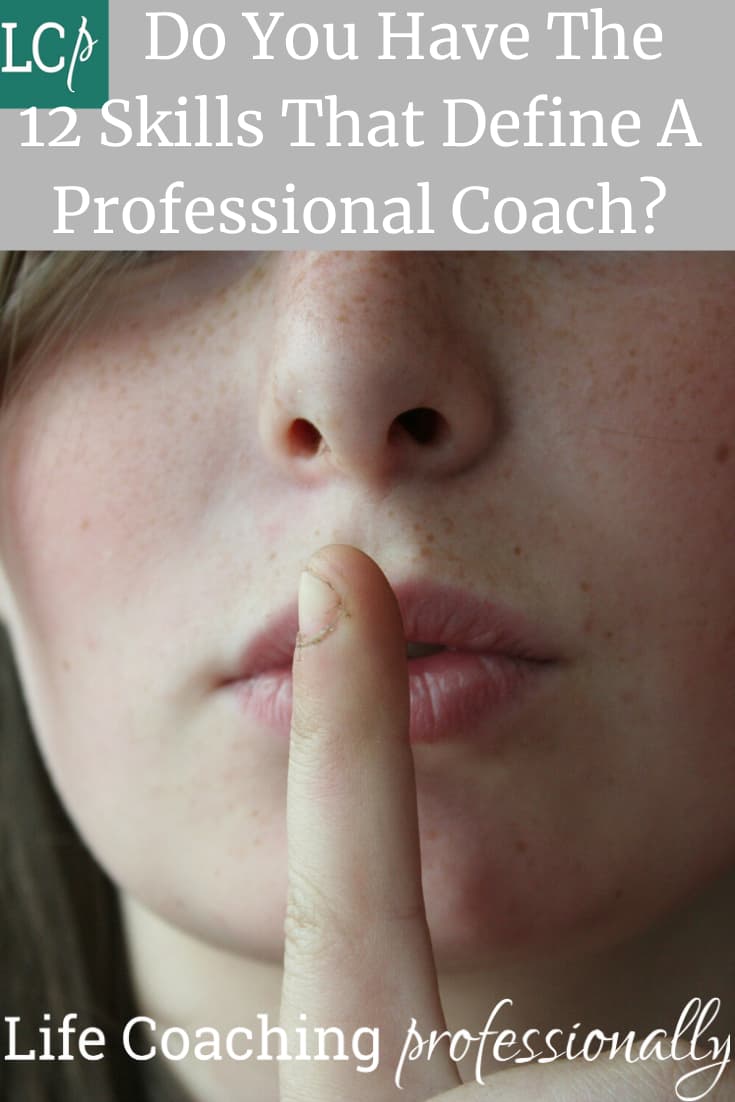Click here to subscribe to my free fortnightly Life Coaching Accelerators, for insider coaching tips.
- Life Coaching
- Resources
- Coaching Tips
30 Life Coaching Tips For Professional Coaches
Page Summary
These life coaching tips are derived from my 20+ years coaching clients worldwide. Many go beyond what you may have learned in your coach training. The tips broadly fit into 2 categories Many of them have links to a fuller description on this website.
FYI: I may receive commissions at no cost to you. I participate in the Amazon Services LLC Associates Program. More...
18 Tips And Strategies To Get More From Your Coaching Sessions
It's impossible for any coach training to cover all the challenges you may get during a life coaching session. Most of these tips were "learned on the job" and I hope you find them useful for yourself and your clients.
1. What to do when a client seems distracted
Have you had the experience where a client doesn’t seem to be quite "with it" and focussed during the session. The client may have filled in their session preparation form (see tip 12 ) sharing how they are going and indicating what they want to work on so you press ahead with the session hoping they will get it together.
But it doesn’t always happen. Something may have occurred that has thrown them off track and is stopping them from being totally present with your coaching.
I solved this happening by asking at the beginning of every session “Are we Ok to go ahead or do you have anything on your mind we need to talk about/handle first?” Then be quiet and wait to see what comes up.
Clearing the space right at the start of every session makes sure you are not trying to coach over a distraction that it taking the client's attention and stopping them from being present.
2. Don't assume - get the facts!
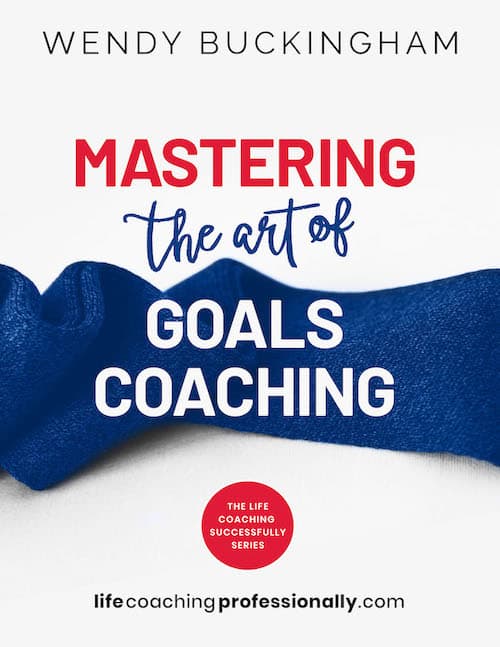
You’ve may have heard the saying “assumptions are the mother of all stuff-ups". It’s about how often a misunderstanding occurs because you or someone else assumed something, thought someone else was taking care of something, or took an opinion or guess as being a fact or the truth.
This tip comes from the chapter in my book Mastering the Art of Goals Coaching on helping you and your clients create a 'Personal’ Success Policy’ around the strategies and behaviours that need to be adopted to create the best chance of success in reaching any goal.
Always aim to get the facts about an issue or question you have rather than making an assumption or listening to an opinion. And make sure you get those facts from someone who really is in a position to know them, and is not just guessing or assuming themselves.
3. To much navel gazing and analysis is not productive
This tip is about the dangers of to much navel gazing - getting the client to look inward and back, rather than up and ahead.
It comes from my aversion from experience to the questions so beloved by many personal growth gurus, “How did you create this”? Or “What’s the lesson?”
The thing is, whilst you are spending time going inwards looking for answers as to why something has gone wrong, not much is happening to solve the problem. It’s Ok if you immediately know what you did to create a particular situation, or what you learned from it and can move on. Otherwise you can waste a lot of energy searching for an answer that may or may not be there, whilst making no progress towards a solution.l.
A much better question to ask yourself and your clients is, “What do I/you want and how can I/you have it?" and plan what needs to be done.
4. A safe way to get anger out of your system
Something someone did or said has upset you and you are still angry about it. It’s going round and around in your head with what you didn’t say, should have said, wish you’d said. It’s driving you mad!
Yet you know it is not going to work, or is not possible, to revisit the issue with the person concerned. It may have even happened a while ago but you can’t let it go.
This is what I do when this happens to me and have found it works for clients who have the same issue.
Write the person a letter or a draft email. Say in it everything you would want to say to them - no holds barred - even mean or historic stuff you have been bottling up and would never actually say. Get it all out of your system.
Then put it aside for a couple of days before looking at it again. Put it away again for a day or so and then have another look. You will often find that by getting it out of your head and writing it down most of the energy you had around the issue is now diluted to the point you feel the need to actually send the communication and feel much better, even complete.
A word of warning though. If it’s an email don’t put the address in - it’s too easy to send it by accident - I learned this the hard way.
5. When did you last take a day off?
Stephen Covey, in his book Seven Habits of Highly Successful People, has ‘renewal’ as the seventh and most neglected habit. That is specific time out for self-nurturing - in whatever form that takes; rest, recreation, time with family – it is a vital well-being and success strategy
When you are overwhelmed, frazzled, needy and tired are you attractive and encouraging to be with to your family, friends or even your clients? I know because I was in danger of becoming all of those until I surrendered and had some R and R, away and without my computer a while ago.
So do allow yourself and, where relevant, encourage your clients, to take time out to smell the roses. Sit in the sun, go for a walk, book a massage, have coffee with a friend or, CV19 permitting, go away for a weekend. Even the most inspired and energetic of us need renewal time to regroup and regenerate. It really pays off.
6. Don't message, pick up the phone!
It may seem much easier, quicker (and less confronting) to handle a difficult situation by email, text or messenger than making a phone call.
Yet for sensitive writing, texting or email communications are usually not the best way to go. Written communication invariably lacks the tone and essence that comes with the spoken word, so is open to misinterpretation.
I admit I used to hide behind the written word when I found personal contact too confronting. What made me change my behaviour was an email altercation that went back and forth for weeks, with both of us getting more angry and frustrated and no conclusion being reached. Finally a simple, if robust, phone call solved the problem.
Speaking physically allowed for quick questions and answers and, most importantly, preserved and strengthened the relationship.
So before you message and text on important or sensitive issues, do consider whether it would be better and more satisfactory to pick up the phone. You can always confirm any important conclusions or agreements in writing.
7. A Powerful Question To Ask Confused And Stressed Clients
Would you like a really powerful question to ask a client who was doing well but turns up to their session confused and stressed. A question that can quickly restore their confidence and get them back on track.
Try “When were you last Ok?” Then follow it up with “What or who happened?”
So often, something that somebody said or did to your client, or an event that occurred, can send their energy spiralling down without their even realising what is happening. Something less obvious that CV19 for instance.
Just helping them identify and acknowledge when they were last OK and what then happened can often be enough to pop them out of their stress and confusion and restore their energy and intention.
Of course you may have to do some more coach probing around the issue, especially if they have trouble spotting the trigger. The main key though is being able to help them identify when they were last doing well and what happened to change things.
8. Why you need to learn to say “NO” graciously
Do you know how to refuse a request? Of course you do. NO is a simple word. But do you have trouble saying NO to the numerous requests that come your way and take your time away from those things and goals you really want to focus on?
I've found clients often have this problem which comes from a need to accommodate and please people.
You can say NO and still keep relationships intact. It can be challenging at first but with intention and practice it will pay off towards being more in control of what you agree to and how you spend your time.
Here are a couple of tips on how to refuse a request elegantly and you’ll find more distinctions at How To Say No Elegantly
- “I’d love to help you, and I’m sure you’ll understand I really have just too much on at the moment.” (who doesn’t want to understand?)
- “It doesn’t work for me to do that for you just now but can I suggest….. (suggest another solution or person)
- I’m really busy just now, so can I get back to you. (This give you time to really consider rather than a knee-jerk and habitual yes.)
9. How To Master Becoming An Online Life Coach
Are you comfortable about coaching online? The restrictions of the Corona Virus (Covid-19) pandemic meant that those of you who have only ever done face to face coaching were faced with having to master the skills of remote life coaching.
If you have only ever coached when you are physically together with your clients your biggest challenge is maybe going to be changing your paradigm about how you can coach successfully by telephone, Skype or Zoom. And conversely convincing prospective clients, who are attached to being with you in person for their sessions, of the same thing.
To help you manage the transition, or help your clients manage the transition I've created a page about Becoming An Online Life Coach which will help you appreciate and talk about the benefits of coaching online (I've done it for years). I’ve also included tips on coaching by phone, mastering the technologies of Zoom and Skype and looking and sounding your best online.
10. Steps To Help Your Life Coaching Clients Make The Best Decisions
How do YOU coach your clients to make a decision when they are flip-flopping from one possibility to another?
This is what I’ve found worked for myself and my clients when there is a dilemma about what to do.
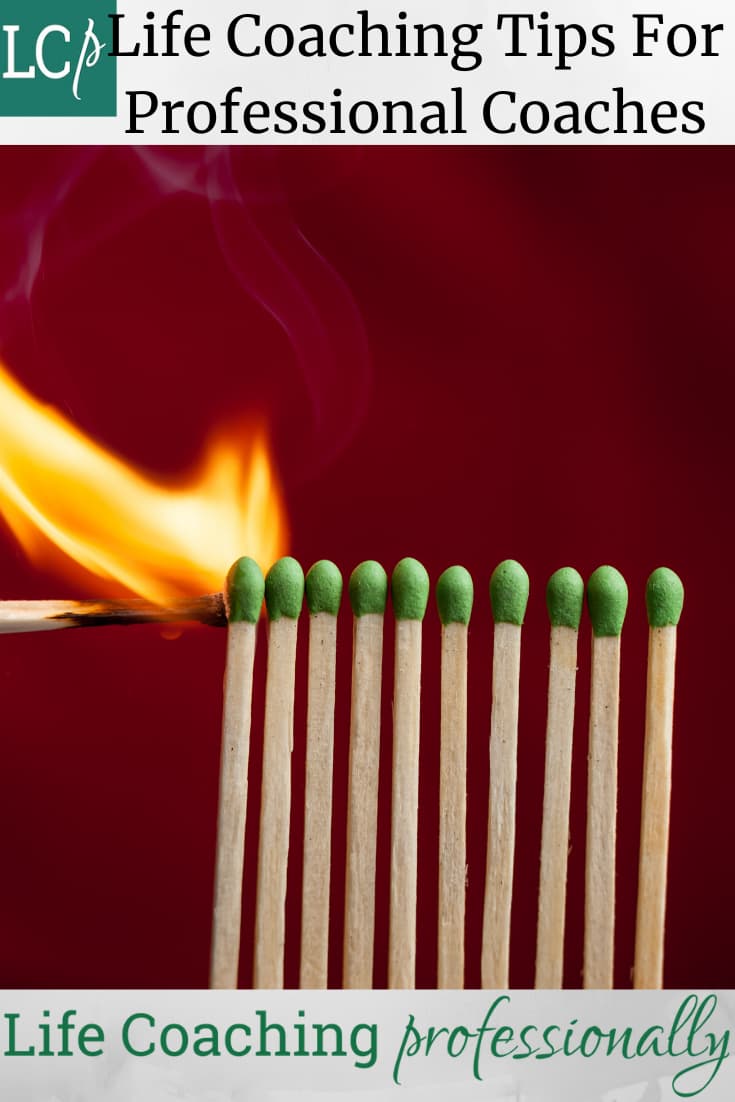
1. On a large sheet of paper, write the choice that has to be made at the top. It might be something like: “Should I Take Office Space For My Coaching?”
2. Now draw vertical columns down the page. One to be headed with each of the possibilities plus an extra one. Then a horizontal line through the middle of the page, dividing the columns in two halves.
3. Name the top of the extra left column “Advantages” and at the halfway line on the page “Disadvantages”.
4. Give each of the columns a sub-heading related to the choices, i.e. “take space in an office hub” or “set up a proper home office”. Even include “Do Nothing for now” as one of your options.
5. Then go through each possibility and fill in what you see the advantages and disadvantages of making that choice. You may even find more possibilities emerge as you do this process.
This really helps get a clearer picture of the possible consequence of each choice and makes it easier to decide on the path forward.
11. The Magic Of Silence
I’ve learned that one of the most important coaching skills to master is to know when to literally "shut up". Ask the powerful question and then just stop talking, keep quiet and let the silence create the space for the client to come up with an answer or a realisation.

And, if after a lengthy silence, nothing is forthcoming the question “What’s happening?” will often result in a thoughtful and useful answer.
I’ve also found saying “anything else?”, or "what else" when the client has answered but you sense there is more (or even if you don’t sense there is more). This can bring forth a bunch of stuff that the client wants to say or has issues with but was hesitant about sharing.
12. The Value Of Using A Session Preparation Form
We all have a favourite coaching tool and the Session Preparation Form is one of mine. It was one of the tools given to me in my CoachU training. What it does is help the client review what has happened for them since the last session, and help the coach see what may need to be addressed. It’s a huge time saver too!.
I’d ask the client to email it to me preferably the day before their session so I would have time to review.
Here are the questions I used. You can adapt them for your coaching.
1. What have I accomplished since our last session. My wins big and little.
2. What I intended to do but didn't
3. What have I learned about myself and others
4. What challenges and problems do I need to address
5. I want to use this coaching session to.....
I'd send a template to the client in Word and get them to save it and fill in and return by email before each session.
13. Turn Those Challenges Into ADVENTURE!
I’ve found a great way to help client through a difficult or challenging time is to reframe the experience as an adventure. Adventures, unlike challenges, can be fun, even though they may involve fear, ups and downs and lots of learning as well as some great wins.
The first time I did this was with a client who wanted to change how she behaved around her family and to be more assertive. Once she saw it as an adventure in her growth, as well as a challenge, her whole attitude changed and it became much easier for her to assert herself.
So if you are coaching any clients around the challenges of the Corona Virus, or some other challenge, and even for yourself, try and see it as an adventure rather than a difficulty to be overcome.
14. What's Really Going On When A Client Wants A Career Change?
Sometimes when life coaching client says they are fed up and want to change their whole career, things may not be what they seem.
With coaching it can turn out that they actually love their skill set and what they are good at but it’s something about working environment that is not aligned with their needs and values that is causing them grief.

A way to check this out and help them get clear on what it is they actually need to change is this simple process:
Have the client identify, preferably by writing it down, what they like about their current job/career – what works for them and what doesn’t. Get them to think about everything from the actual tasks, to location, office set up, pay, the people they work with, prospects, etc. etc.
It may turn out that they love what they actually do, are skilled at, or something similar. It's something else that is making them unhappy in their current position and that is what really needs to be addressed before they make a complete change.
And if it does turn out they need to change careers, they will have a much clearer idea of their best direction. You can see an actual case study on how this happened for a client of mine in the second example in these actual career coaching case studies
15. How to stay motivated towards your goals on those "hard" days.
How do you stay motivated on those “hard” days? Those times when the creative juices seem to have dried up around your goals and all you seem to be able to do is stare into space or fluff around. You still really want the goal but it all seems just too hard.
Of course, unless there are circumstances preventing it, you could go for a walk, have a coffee, call a friend etc. etc. but you know what you really need do is actually get something done!
Here’s a technique that has worked for me when inertia sets in. Go forward in your mind to the end of the day and look back. How will you feel if you have spent the day procrastinating? Then imagine how you will feel if, as you snuggle down to sleep, you have overcome that inertia, (and it is just a feeling) and can acknowledge yourself for having taken even a little step towards your goal - such as a phone call, an email written, a Facebook post – whatever.
I guarantee if you stop procrastinating and do just a small step to move forward it will lift your spirits and get you moving again.
16. Creating Weight Loss Success Stories
Often when clients are deciding on their big career or business goals for a coaching session they slip in "and I could do with losing some weight".

And if your coaching niche is health and fitness, then this scenario is almost a given.
But losing weight can be one of the hardest goals to achieve because there are so many insidious challenges your clients can face that get in the way. For instance, what are they willing to 'give up' to achieve the goal.
To make weight loss goals easier to achieve I’ve put together six tips specifically to support goals to lose weight. They will help you coach your clients to have the result they are looking for and you to have some weight loss success stories to brag about.
17. Make The Team "Own" The Company Goal
This one is for coaches who do group or team coaching. Company and team goals need to be about more than company values, the mission, the outcome and the time frame, rah rah, etc. It’s about really enrolling the employees in the company goal so they can own it for themselves.
The way to do this is to make sure that each person involved has a personal benefit or goal that they will achieve if the team or company goal is reached.
So when working with such a group the coaching should include helping each person in the group identify a “what’s in it for me?” reason.
Because if a person cannot see the benefit in achieving a goal, whether it is their own or that of their employer, they won’t wholeheartedly own it and be seriously motivated towards achievement. And, as we all know, just one person who is not enrolled in a group goal can sabotage the whole show. Check out some more of my tips on group and team coaching
18. Comparisons are a waste of energy
Are you constantly comparing yourself with others? I’ve come to realise that when it comes to comparing ourselves to others as coaches it can be really self-destructive. There will always be someone who charges more or less has more "Likes" on their Facebook page and so on. But it doesn’t matter! You’re you a unique coach doing what you do to the best of your ability with your own goals and aspirations.
To put in plain words (adapted from what I found on Wikipedia) “Comparison is witless because each person (coach) is unique. By comparing yourself or your work with others, you only annihilate your brilliance or passion, thus further losing your self-reliance.”
So when you (or your clients) next start indulging in the "I'm not as good as...” stop and remember its pointless and self-destructive to compare yourself to others. Rather set some firm and powerful goals for yourself and go for it!
Tips For Marketing And Growing Your Life Coaching Practice
Getting out there and raising your profile as a coach, whatever your niche or speciality, can be a challenge. One size does not fit all when choosing a marketing strategy. These marketing related tips will give your some ideas that are not only sure-fire ways of attracting clients, but are creative and affordable.
1. Why have a business card?
Why You Should Still Have A Business Card? Even in these days of social media connection and Covid 19 disconnect don’t overlook the value of the business card as a basic coach marketing tool.
You need a business card that will really do the job of making you memorable, whether you give it out to a coaching prospect, a neighbour, someone you meet on the train or plane or a persona of influence in your niche who may refer your a client.
A business card is a tangible and hopefully memorable artefact that can tell those you come into physical contact with about you, what you do, and who you do it for.
2. The importance of a disclaimer on your website

It's advisable to have a legally worded disclaimer on your website. You will especially need one if your coaching in a niche area that may be considered related to therapy, such as mental, health, ADHD, trauma coaching and so on.
And irrespective of the amount of coach training you have undertaken, if you identify yourself as coaching in health related coaching niches, and are not a qualified and licensed therapist in that area, take heed or you could be on shaky legal ground.
Coaches who offer any sort of health advice on their social media profiles or website, should be careful not to stray outside the parameters of coaching. They must make sure that the reader understands the boundaries of coaching and do not take the coaches suggestions as medical advice.
You can see how I have demonstrated this in the disclaimer on my tips to achieving weight-loss goals page to make sure I do not stray into the territory of eating disorders
3. Should your refund policy be set in stone
Should your refund policy be set in stone?
Of course every coach should have a firm refund policy as part of the fee structure, but there should also be room to be flexible and judge each request for a refund on its merit.
I learned the hard way that sometimes it is better to graciously refund that stick to your entitlement guns.
A client who had booked and paid for 10 sessions, decided after eight sessions that she was done and didn’t need any more. She’d had lots of wins and her feedback was the coaching had been a success. She asked for a refund for the two unused sessions.
Now I was quite with my refund policy rights to refuse a refund, which I did. The results was a happy client who then become resentful, and sent a nasty email. Not nice and it stung for ages.
I learned that it would have been far better to have lost a few $$ and kept her good will towards me even though I was technically in the right.
So by all means have a firm refunds policy but also use your judgement with each request. Sometimes it is better to sacrifice a few dollars (even if you really need them) than have an ex-client out there who will speak ill of you and certainly won’t refer others to you.
4. Don't let poor computer positioning ruin your online presentation
Do you like looking up people's noses? I doubt it. But this is just what happened to me when I was watching a panel show on TV where, because of CV19, all the participants were online rather than being in the studio.
Because of the way one of the panel member had positioned her laptop on her desk or table, every time the camera was on her I found myself looking up her rather large nostrils. Not a good look and it really distracted me from were the interesting comments she was making.
So do take the time to test the position of the camera on your mobile or laptop when you are on a Zoom call with colleagues or clients to make sure you are seen as you want to be seen and don't have people looking up your nose.
And if you keen on using speaking as part of your marketing strategy, but don't know where to start, check out my eBook How to Use Speaking to Promote Your Coaching. You'll get tips on how to get started, ingredients for a successful presentation, and how to control the presentation space and avoid disasters, both in person or online.
5. 14 Website mistakes to avoid
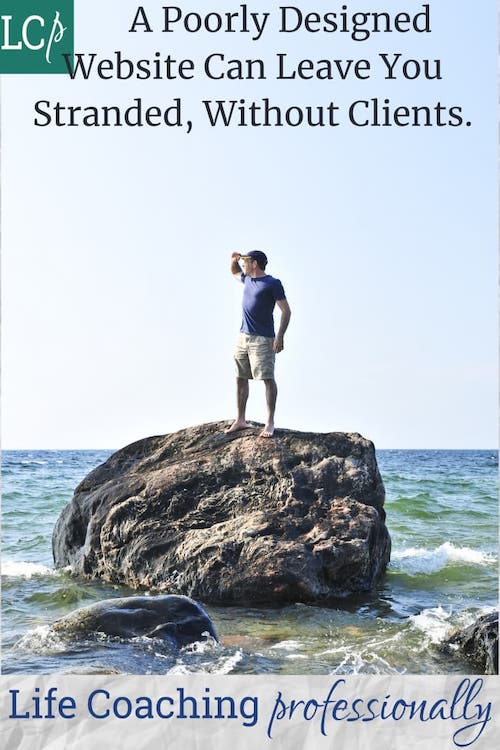
What mistakes do you wish you hadn’t made when creating your coaching website?
Hindsight is 20/20 vision and looking back on how you went about it and what you now would do differently is no exception.
So this tip is about website mistakes you can avoid making or, if you already have a website correct, so you don’t end up with a lot of ‘I should’ve” or I”could’ve” or “I’ve now got to’s” to make your website work to attract clients.
So, if you are just about to embark on the website journey, or even if you have a website that you know could be doing it’s job better, get familiar with these 14 Common Website Mistakes.
Also be sure to read the sad and true case study of a website disaster that could easily have been avoided.
6. How To Use Your Personal Face Book Profile As A Marketing Tool
What do prospective clients see when the click on your FB profile? Is it information about you and your coaching practice, or is it a lot of irrelevant chat. This tip came to me after listening to Cindy Schulson’s brilliant 3 Ways To Get Clients Online webinar, and a comment made by host Emma Elsey..
As a moderator for the Coaches Helping Coaches forum, I regularly clicks on members profiles to see who they are and what they do as coaches. I get frustrated when all I see is posts and pics about their partner, their kids and their pet and/or what might inspire them. What I want to know, and I think other people who check out your profile often want to know, is how do you relate to me in a coaching context.
Often the space where they can post an introduction is blank. So do take a few moments to fill this intro in with a few words about what you do professionally and a link either to your website, blog, LinkedIn, or your Facebook business page and don't miss this important marketing opportunity.
7. How To Get Coaching Work Through Coaching Providers
For those coaches (and there are many) who have great coaching skills but have a challenge successfully marketing themselves, one solution is to take advantage of someone else's marketing expertise.
This can be done by getting on the books of a company that provides coaching services to businesses and organisations who choose to outsource their coaching needs, rather than use internal coaches.
And, on a smaller scale, some entrepreneurial individual coaches leverage their coaching by creating a website that promotes other coaches under their brand - either for free or a fee or commission.
So how do you go about getting listed with them? Read this page which explains how the system works and tips on making sure you get a good deal.
8. Tips For Presenting In Person and Online
I've always found one of the best ways to attract committed clients is to get over any fear of public speaking and deliver a lively informational and motivational presentation around your coaching specialty.
When live presentations were off the table because of the Covid pandemic, online presentations and webinars become the thing. So I was prompted to add a section to my eBook How to Use Speaking to Promote Your Coaching about the distinctions of presenting using an online platform and the traps to avoid.
For the price of a coffee and a cake, this book has all the low down to support you to get started and feel confident about presenting whether you have a face to face or online audience. I wrote it from my own experience and the help I got along the way. You can preview and experience some of the content by clicking on the link.
9. When Should You Accept An Invitation To Guest Blog or Comment?
Yes, guest blogging can be a great way to raise your profile but you need to be selective as to when you say yes. Unfortunately, however flattering it is to be asked to contribute, sometime it will just be a waste of your time and energy.
Here are three things to check before you say yes, so your contribution works in your favour.
1. Check our the host blog
Is it somewhere you would like to see your name as a professional coach? Is the design and focus likely to bring you visitors to your site?
2. How many subscribers does the host blog have?
For your guest blog to be seen and have any benefit for you, there need to be at least a few hundred followers. Unless you are really keen to be on a new blog because of its quality and relevance, contributing could be a waste of effort and time.
3. Be original
Make your contribution original with a bit of rewriting. Material that is substantially the same as something you have already published on your website may not do well with the search engines.
10. Regularly Check Your Website For Broken Links
This tip, I’m ashamed to say, comes for my own discovery that on one of the pages on this site four of the links weren’t working at all or going to the wrong place. Not a good look!
I don't know about you, but If I go to a site where a link is not working I might, if I’m feeling charitable, let the owner of the site know. But often can’t be bothered and just leave the site and move on. So even if I was interested in what the site offered, I’m lost as a customer/client.
So I do thoroughly recommend to all your website and blog owners out there, please check your links regularly to make sure they are working and linking to where you want them to.
It’s easy to do, just bookmark Broken Link Check (https://www.brokenlinkcheck.com) enter your website address and it will come up with a complete list of any links on your site that are broken.
11. Using A Book About Your Life Coaching As A Marketing Tool
Do you have a book inside you about your coaching niche just waiting to burst out. A book can be a fabulous way to be recognised as an expert.
And In these days of social isolation, (at time of writing) it could be just the time to have the time to start turning that dream of being an author into a real goal.
But where to start? Writing a book can be a bit overwhelming but as with all goals, it’s getting clarity and then small steps.
So here are just three steps to help you make a start.
1. Set a firm goal
This should be the first essential step to turn your dream of becoming an author. So set a powerful goal that inspires you and has a provisional completion date.
2. Do your research
Ask yourself who specifically will my book help. Is there some new information or a different perspective on your coaching you want to put out there?
If there is no real point of difference in your book compared with what is already available in a crowded marketplace, (check out Amazon and your local book store). You may need to come up with a unique angle or title.
3. Little steps to create the content
If you don’t know where to start, write down the subjects that you are going to cover and use these as working chapter headings. Underneath each heading, bullet point what you need to cover and then enlarge on each point.
You'll find lots more tips on taking that book from a dream into a published reality here:
I hope you have found these tips helpful. From time to time I will be adding to them, so do keep in touch. Also I invite you to subscribe to my Life Coaching Accelerators for lots more insider coaching tips.
More help to grow your coaching skills and promote yourself
I have written a wide range of informative books (all from my own 25+ years experience) that will help you to authentically attract new quality clients, increase your coaching skills and promote your coaching services.
100% Satisfaction or Your Money Back
I am sure you will get real value from each of these books. However, if within 30 days of purchase you are not 100% completely satisfied, you will receive a full 100% refund.
